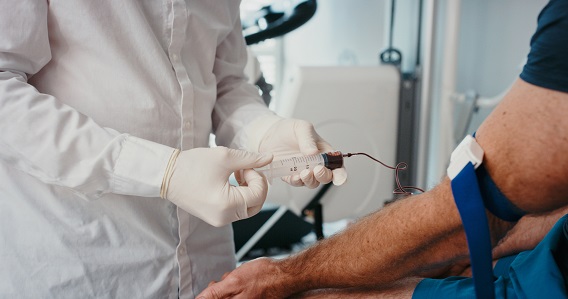Mayo Clinic Reveals New Test for Mesothelioma
Research & Clinical TrialsWritten by Travis Rodgers | Edited By Amy Edel

Mayo Clinic researchers have created a new blood test to better detect mesothelioma. This could result in earlier diagnoses. It might also lead to new options for targeted therapies. The test finds complex DNA patterns that are common in mesothelioma cells.
This new approach is more accurate than standard mesothelioma blood tests. This may also lead to better tracking of how a patient’s treatment is progressing. Experts hope this new blood test will pave the way for more personalized mesothelioma treatments.
Snehal Smart is our in-house doctor and a board certified Patient Advocate at The Mesothelioma Center. She shares with us what this new test could mean for patients.
“This advancement brings hope to potentially help many patients who know they have been exposed to asbestos,” Snehal says. “They may be able to get checked earlier and faster.”
“This is especially helpful in cases when the patient is elderly and unable to get a biopsy,” she explains. “A simple blood test would be a fast way for a patient to know whether their mesothelioma is responding to their treatment plan.”
Aaron Mansfield, M.D., a medical oncologist, led the study at the Mayo Clinic’s Center for Individualized Medicine and Cancer Center. He said in a news release, “We’re pushing the frontiers of what’s possible in blood-based monitoring. Improving detection rates could offer insights into monitoring patients’ responses to therapy and detecting recurrence after surgery.”
Details About the New Mesothelioma Study
This new blood test looks for specific DNA patterns. They’re called “chromosomal rearrangements.” Most blood tests look for single-point DNA mutations.
Typical mesothelioma cells have “swapped” or “shuffled” sections of DNA. Mesothelioma may also have fewer single-point mutations than other types of cancer.
Researchers used what’s called whole genome sequencing. This is a way to read all the DNA in a living thing to understand its genetic instructions. DNA contains genetic instructions that determine how an organism grows, functions and develops.
Whole genome sequencing looks for changes (mutations) in a person’s DNA that can make cells grow uncontrollably. These changes act like broken instructions, and scientists use sequencing to spot them, identify cancer and understand how to treat it.
This new blood test can help locate key chromosomal changes in the DNA of cancer cells. The scientists then created tiny pieces of DNA in a lab called “primers.” The primers match and attach to changes in the chromosomes. Then the blood test searches for those changes.
This breakthrough may lead to faster, more accurate detection of mesothelioma. Early detection is key to starting treatment sooner and having more options. This can lead to better patient outcomes.
Past and Future Plans for Mesothelioma Research
The Mayo Clinic’s discovery builds on earlier tests for mesothelioma. This includes a study predicting which patients with mesothelioma may benefit from immunotherapy.
Immunotherapy can target cancer cells without harming healthy tissue. Unlike chemotherapy and radiation, it doesn’t harm healthy tissue.
More research is planned for the future to expand the study. Next, they plan to include more patients and further improve the test. The complete study is published in the Journal of Thoracic Oncology Clinical and Research Reports.






